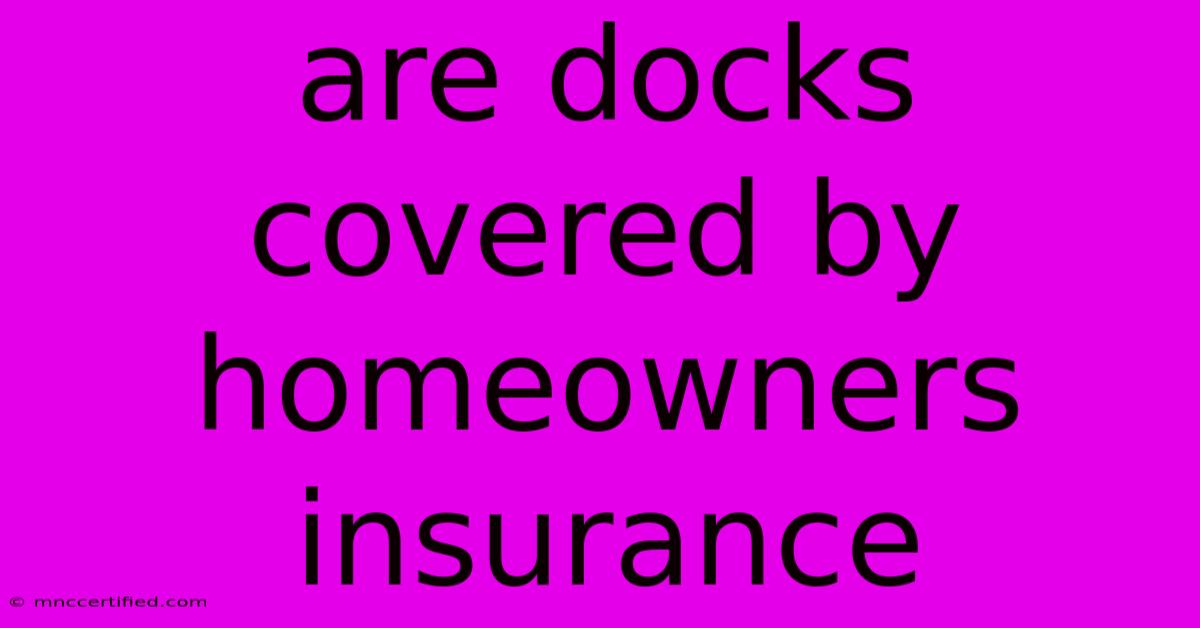Are Docks Covered By Homeowners Insurance

Table of Contents
Are Docks Covered by Homeowners Insurance? A Deep Dive into Coverage
Docks are often a beloved part of waterfront property, offering a peaceful place to relax, fish, or simply enjoy the view. But what happens if your dock is damaged or destroyed? Is it covered by your homeowners insurance policy? The answer, unfortunately, isn't always a simple yes or no.
Understanding Homeowners Insurance and Dock Coverage
Homeowners insurance policies are designed to protect your home and personal belongings from various risks, including fire, theft, and natural disasters. However, coverage for structures like docks can vary significantly depending on several factors:
- Policy specifics: Your policy's wording is crucial. Read your policy carefully to identify any specific exclusions or limitations regarding dock coverage.
- Dock type: The type of dock you own can impact coverage. Fixed docks, often considered permanent structures, are more likely to be covered than floating docks, which are viewed as more temporary.
- Location: The location of your dock relative to your home can influence coverage. Docks situated directly on your property are generally considered part of your home's structure and may be covered. However, docks located further out in the water might be viewed as separate structures with less coverage.
- Cause of damage: The reason for the dock's damage is also critical. Homeowners insurance typically covers damage caused by covered perils, such as storms, fires, or vandalism. However, damage caused by wear and tear, lack of maintenance, or normal aging may not be covered.
Common Exclusions to Dock Coverage
While some homeowners insurance policies may include dock coverage, there are common exclusions to be aware of:
- Flooding: Most standard homeowners insurance policies do not cover damage caused by flooding. If you live in a flood-prone area, you may need to purchase separate flood insurance.
- Wear and tear: Homeowners insurance generally doesn't cover damage caused by normal wear and tear, such as aging materials or deterioration.
- Neglect: Damage caused by your failure to maintain the dock properly may not be covered by your insurance.
- Maintenance: Routine repairs and maintenance are typically not covered by homeowners insurance.
What to Do to Protect Your Dock
Understanding the limitations of your homeowners insurance is essential. To ensure your dock is adequately protected, consider these steps:
- Review your policy: Carefully read your homeowners insurance policy and identify any specific exclusions or limitations regarding dock coverage.
- Contact your insurer: Ask your insurance agent about your dock's coverage and discuss any potential gaps in protection.
- Consider additional coverage: You may need to purchase supplemental insurance to address specific risks, such as flood damage or damage caused by boat collisions.
- Proper maintenance: Regularly inspect your dock for any signs of damage or wear and tear. Promptly address any issues to prevent further damage.
- Documentation: Keep detailed records of your dock's construction, maintenance, and any repairs. This documentation can be helpful if you need to file a claim.
Conclusion
The coverage of docks under homeowners insurance can be complex. It's crucial to thoroughly understand your policy's terms and conditions and discuss your specific needs with your insurance agent. By taking proactive steps to protect your dock and ensuring adequate coverage, you can enjoy peace of mind and minimize the potential financial impact of damage or loss.

Thank you for visiting our website wich cover about Are Docks Covered By Homeowners Insurance. We hope the information provided has been useful to you. Feel free to contact us if you have any questions or need further assistance. See you next time and dont miss to bookmark.
Featured Posts
-
48 Million Profit Polymarket Whales Trump Bet
Nov 07, 2024
-
Republicans Excited For Project 2025 Launch
Nov 07, 2024
-
Barcelona Predicted Xi Champions League Match Vs Crvena Zvezda
Nov 07, 2024
-
Adam Grimes The Art And Science Of Trading
Nov 07, 2024
-
Shetland Back And Thriving Again
Nov 07, 2024